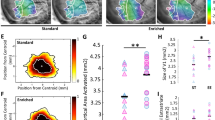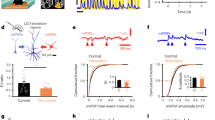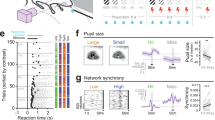Abstract
Environmental enrichment potentiates neural plasticity, enhancing acquisition and consolidation of memory traces1. In the sensory cortices, after cortical circuit maturation and sensory function acquisition are completed, neural plasticity declines and the critical period 'closes'2. In the visual cortex, this process can be prevented by dark-rearing, and here we show that environmental enrichment can promote physiological maturation and consolidation of visual cortical connections in dark-reared rats, leading to critical period closure.
This is a preview of subscription content, access via your institution
Access options
Subscribe to this journal
Receive 12 print issues and online access
$209.00 per year
only $17.42 per issue
Buy this article
- Purchase on Springer Link
- Instant access to full article PDF
Prices may be subject to local taxes which are calculated during checkout



Similar content being viewed by others
References
Cotman, C.W. & Berchtold, N.C. Trends Neurosci. 25, 295–301 (2002).
Berardi, N., Pizzorusso, T., Ratto, G.M. & Maffei, L. Trends Neurosci. 26, 369–378 (2003).
Molteni, R., Ying, Z. & Gomez-Pinilla, F. Eur. J. Neurosci. 16, 1107–1116 (2002).
Carro, E., Trejo, J.L., Busiguina, S. & Torres-Aleman, I. J. Neurosci. 21, 5678–5684 (2001).
Fagiolini, M., Pizzorusso, T., Berardi, N., Domenici, L. & Maffei, L. Vision Res. 34, 709–720 (1994).
Pizzorusso, T. et al. Science 298, 1248–1251 (2002).
Huang, Z.J. et al. Cell 98, 739–755 (1999).
Benevento, L.A., Bakkum, B.W. & Cohen, R.S. Brain Res. 689, 172–182 (1995).
Maurer, D., Lewis, T.L., Brent, H.P. & Levin, A.V. Science 286, 108–110 (1999).
Frolich, L. et al. J. Neural Transm. 105, 423–438 (1998).
Pham, T.M., Winblad, B., Granholm, A.C. & Mohammed, A.H. Pharmacol. Biochem. Behav. 73, 167–175 (2002).
Gianfranceschi, L. et al. Proc. Natl. Acad. Sci. USA 100, 12486–12491 (2003).
Acknowledgements
This work was supported by MIUR COFIN, Fondazione Telethon, FIRB and FISR.
Author information
Authors and Affiliations
Corresponding author
Ethics declarations
Competing interests
The authors declare no competing financial interests.
Supplementary information
Rights and permissions
About this article
Cite this article
Bartoletti, A., Medini, P., Berardi, N. et al. Environmental enrichment prevents effects of dark-rearing in the rat visual cortex. Nat Neurosci 7, 215–216 (2004). https://doi.org/10.1038/nn1201
Received:
Accepted:
Published:
Issue Date:
DOI: https://doi.org/10.1038/nn1201
This article is cited by
-
Enriched environment exposure during development positively impacts the structure and function of the visual cortex in mice
Scientific Reports (2023)
-
Review: adult neurogenesis contributes to hippocampal plasticity
Cell and Tissue Research (2018)
-
The role of cognitive activity in cognition protection: from Bedside to Bench
Translational Neurodegeneration (2017)
-
The Topographical Arrangement of Cutoff Spatial Frequencies across Lower and Upper Visual Fields in Mouse V1
Scientific Reports (2015)
-
How does the bilingual experience sculpt the brain?
Nature Reviews Neuroscience (2014)



